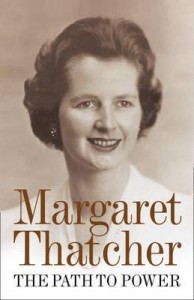 While I was in New Zealand, I happened across a book sale at one site. I’m naturally drawn to such things, so I spent a few minutes perusing the offerings. To my delight, I saw Margaret Thatcher’s The Path to Power on the table. It’s the second volume of her autobiography, following after The Downing Street Years. In The Path to Power, she explains her early years and how she eventually worked her way to the prime ministership.
While I was in New Zealand, I happened across a book sale at one site. I’m naturally drawn to such things, so I spent a few minutes perusing the offerings. To my delight, I saw Margaret Thatcher’s The Path to Power on the table. It’s the second volume of her autobiography, following after The Downing Street Years. In The Path to Power, she explains her early years and how she eventually worked her way to the prime ministership.
I’ve been a fan of Thatcher since the 1980s, but had never read one of her books. Here was this one for the paltry sum of $1 in New Zealand currency, which meant it cost even less in American money. How could I pass it by? Well, I didn’t.
Reading the opening chapters on the plane back to the U.S., I was reminded that she attended Oxford during WWII. Suddenly, I realized that she was at Oxford at the same time that C. S. Lewis was coming to prominence there. Naturally, I wondered if she had been influenced by him at all. I didn’t have to go too far into that chapter to find the following commentary from the woman who was raised a Methodist:
Generally speaking . . . I did not go to Anglican churches. But oddly enough—or perhaps not so oddly when one considers the great impact he had on so many of my generation—it was the religious writing of that High Anglican C. S. Lewis which had most impact upon my intellectual religious formation.
The power of his broadcasts, sermons and essays came from a combination of simple language with theological depth. Who has ever portrayed more wittily and convincingly the way in which Evil works on our human weaknesses than he did in The Screwtape Letters? Who has ever made more accessible the profound concepts of Natural Law than he did in The Abolition of Man and in the opening passages of Mere Christianity?
I remember most clearly the impact on me of Christian Behaviour (republished in Mere Christianity, but originally appearing as radio talks). This went to the heart of the appalling disparity between the way in which we Christians behave and the ideals we profess.
What an excellent passage and an insight into the thinking of Margaret Thatcher. How encouraging to know that C. S. Lewis touched her life in this way.
